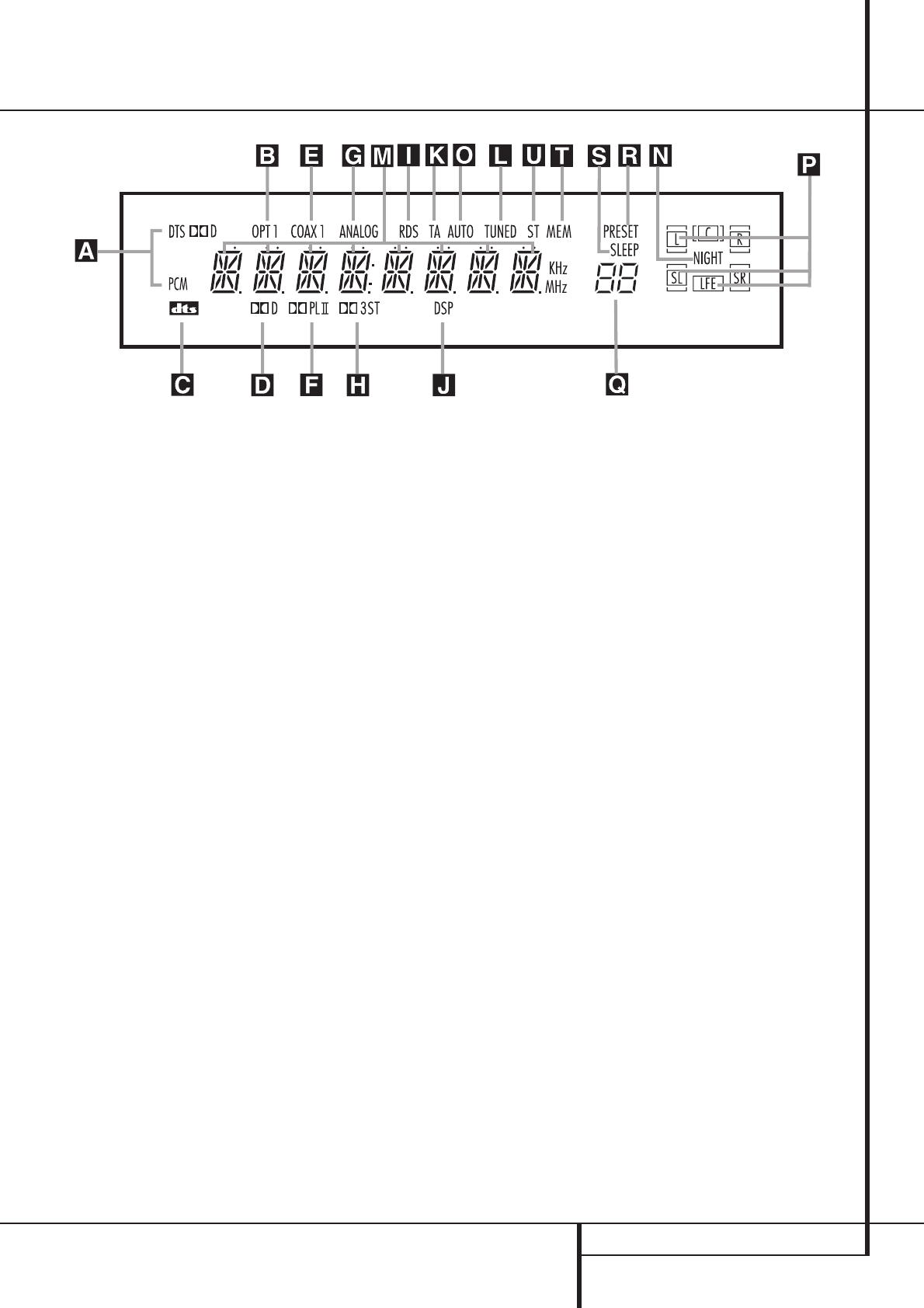
A
B
C
D
E
F
G
H
I
J
K
L
M
N
O
P
Q
R
S
T
U
FRONT PANEL INFORMATION DISPLAY 7
Front Panel Information Display
Bitstream Indicators
Optical Source Indicators
DTS Mode Indicator
Dolby Digital Indicator
Coaxial Digital Input Indicators
Dolby Pro Logic II Indicator
Analog Input Indicator
Dolby 3 Stereo Indicator
RDS Indicator
DSP Mode Indicator
Traffic Program Indicator
Tuned Indicator
Main Information Display
Night Mode Indicator
Auto Indicator
Speaker/Channel Input Indicators
Preset Number/Sleep Timer
Preset Indicator
Sleep Indicator
Memory Indicator
Stereo Indicator
A
Bitstream™ Indicators:When the input is a
digital source, one of these indicators will light to
display the specific type of signal in use.
B
Optical Source Indicators: These indica-
tors light to show when a Optical Digital Input
has been selected.
C
DTS Mode Indicator: This indicator illumi-
nates when the DTS mode is selected.
D
Dolby Digital Indicator: This indicator
illuminates when Dolby Digital mode is selected.
E
Coaxial Digital Input Indicators: These
indicators light to show when a Coaxial Digital
Input has been selected.
F
Dolby Pro LogicII Indicator: This indica-
tor lights when the Dolby Pro Logic II mode has
been selected.
G
Analog Input Indicator: This indicator lights
when an analog input source has been selected.
H
Dolby 3 Stereo Indicator: This indicator
lights when the Dolby 3 Stereo Mode has been
selected. Only ST(Stereo) will light when
"Surround Off" has been selected.Then all
Surround Modes are turned off and the unit will
play in pure stereo mode.
I
RDS Indicator: This indicator illuminates
when the station tuned is transmitting RDS data.
J
DSP Mode Indicator: This indicator lights
when any of the surround modes created by
Digital Signal Processing, or DSP are in use.
These modes include Hall 1, Hall 2,Theater and
5 Channel Stereo.
K
Traffic Program Indicator: This indicator
illuminates if the RDS station tuned sometimes
transmits traffic information (see page 24 for
more information on RDS).
L
Tuned Indicator: This indicator illuminates
when a station is being received with sufficient sig-
nal strength to provide acceptable listening quality.
M
Main Information Display: This display
shows messages relating to the status, input
source, surround mode, tuner, volume level or
other aspects of unit’s operation.
N Night Mode Indicator: This indicator
lights when the AVR 1550 is in the Night mode,
which preserves the dynamic range of digital
program material at low volume levels.
O
Auto Indicator: This indicator illuminates
when the tuner’s Auto mode is in use.
P Speaker/Channel Input Indicators: These
indicators are multipurpose, indicating either the
speaker type selected for each channel or the
incoming data-signal configuration.The left, cen-
ter, right, right surround and left surround speaker
indicators are composed of three boxes, while the
subwoofer is a single box. When the letters flash,
the digital input has been interrupted. (See page
18 and 27 for more information on the Channel
Indicators).
Q
Preset Number/Sleep Timer: When the
tuner is in use, these numbers indicate the spe-
cific preset memory location in use. (See page 24
for more information on preset stations.) When
the Sleep function is in use, these numbers show
how many minutes remain before the unit goes
into the Standby mode.
R
Preset Indicator: This indicator lights when
the tuner is in use to show that the Preset
Number/Sleep Timer
Q
is showing the sta-
tion’s preset memory number. (See page 24 for
more information on tuner presets.)
S
Sleep Indicator: This indicator lights when
the Sleep function is in use. The numbers in the
Preset/Sleep Number Indicators will show the
minutes remaining before the AVR 1550 goes
into the Standby mode. (See page 19 for more
information on the Sleep function.)
T Memory Indicator: This indicator flashes
when entering presets and other information
into the tuner’s memory.
U
Stereo Indicator: This indicator illuminates
when an FM station is being tuned in stereo.


















